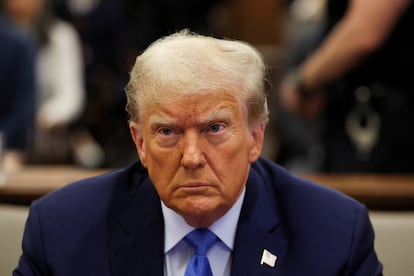New York judge imposes gag order on Donald Trump in hush money case
Judge Juan M. Merchan on Tuesday cited Trump’s previous comments about him and others involved in the case, as well as a looming April 15 trial date, in granting the prosecution’s request for a gag order

A New York judge Tuesday issued a gag order barring Donald Trump from making public statements about witnesses, prosecutors, court staff and jurors in his upcoming hush-money criminal trial. Judge Juan M. Merchan cited Trump’s previous comments about him and others involved in the case, as well as a looming April 15 trial date, in granting the prosecution’s request for a gag order. “It is without question that the imminency of the risk of harm is now paramount,” Merchan wrote.
Prosecutors had asked for the gag order, citing what they called his “long history of making public and inflammatory remarks” about people involved in his legal cases.
The order also bars Trump from making or directing others to make public statements about people involved in the trial, but it does not apply to the Manhattan District Attorney Alvin Bragg because he is an elected official. The gag order adds to restrictions put in place after Trump’s arraignment last April that prohibit him from using evidence in the case to attack witnesses.
The trial, involving allegations related to hush money paid during Trump’s 2016 campaign to cover up marital infidelity claims, had been in limbo after his lawyers complained about a recent deluge of nearly 200,000 pages of evidence from a previous federal investigation into the matter.
Trump’s lawyers accused Bragg’s office of intentionally failing to pursue evidence from the 2018 federal investigation, which sent Trump’s former lawyer Michael Cohen to prison. They contended prosecutors working under Bragg, a Democrat, did so to gain an unfair advantage in the case and harm Trump’s election chances. Cohen, now a vocal Trump critic, is poised to be a key prosecution witness against his ex-boss.
Merchan bristled at the defense’s claims at a hearing Monday, saying the DA’s office had no duty to collect evidence from the federal investigation, nor was the U.S. attorney’s office required to volunteer the documents. What transpired was a “far cry” from Manhattan prosecutors “injecting themselves in the process and vehemently and aggressively trying to obstruct your ability to get documentation,” the judge said.
The DA’s office denied wrongdoing and blamed Trump’s lawyers for bringing the time crunch upon themselves by waiting until Jan. 18 to subpoena the records from the U.S. attorney’s office — a mere nine weeks before the trial was originally supposed to start. Merchan, who earlier this month postponed the trial until at least mid-April to deal with the evidence issue, told defense lawyers that they should have acted sooner if they believed they didn’t have all the records they wanted.
Though the hush money case is seen as less consequential than his other prosecutions — which charge him with conspiring to overturn the results of the 2020 presidential election and illegally retaining classified documents — it has taken on added importance given that it’s the only one that appears likely for trial in the coming months.
The trial will begin with jury selection, a potentially arduous task given the publicity surrounding the case and Trump’s wild unpopularity in heavily Democratic Manhattan.
Trump has pleaded not guilty to charges that he falsified business records, a felony punishable by up to four years in prison, though there is no guarantee a conviction would result in jail time. Manhattan prosecutors say Trump did it as part of an effort to protect his 2016 campaign by burying what he says were false stories of extramarital sex. Trump on Monday repeated to reporters his claims that the case is a “witch hunt” and “hoax.”
Sign up for our weekly newsletter to get more English-language news coverage from EL PAÍS USA Edition
Tu suscripción se está usando en otro dispositivo
¿Quieres añadir otro usuario a tu suscripción?
Si continúas leyendo en este dispositivo, no se podrá leer en el otro.
FlechaTu suscripción se está usando en otro dispositivo y solo puedes acceder a EL PAÍS desde un dispositivo a la vez.
Si quieres compartir tu cuenta, cambia tu suscripción a la modalidad Premium, así podrás añadir otro usuario. Cada uno accederá con su propia cuenta de email, lo que os permitirá personalizar vuestra experiencia en EL PAÍS.
¿Tienes una suscripción de empresa? Accede aquí para contratar más cuentas.
En el caso de no saber quién está usando tu cuenta, te recomendamos cambiar tu contraseña aquí.
Si decides continuar compartiendo tu cuenta, este mensaje se mostrará en tu dispositivo y en el de la otra persona que está usando tu cuenta de forma indefinida, afectando a tu experiencia de lectura. Puedes consultar aquí los términos y condiciones de la suscripción digital.








































